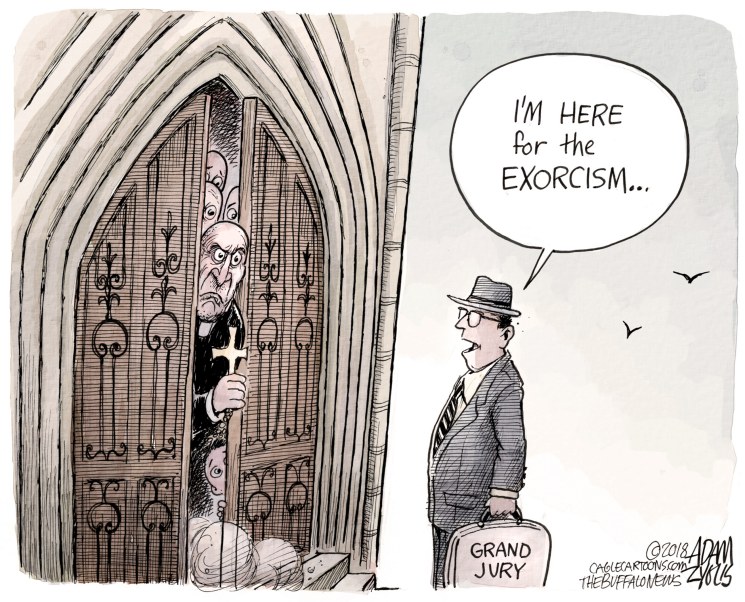‘Wrecked’: Abuse Survivors On Their Connection to Church
by John L. Micek
It's "wrecked."
Dougherty, who lives about 90 minutes west of Pittsburgh, was among the more than 1,000 victims who suffered unspeakable suffering at the hands of more than 300 priests across Pennsylvania, with the oldest incidents dating to the 1940s.
And for decades, officials at the highest levels of Pennsylvania's Roman Catholic church engaged in criminally shameful conspiracy of silence, covering up horrific acts of sexual abuse by clergy.
Then, incomprehensibly, rather than removing these abusers from the pulpit and reporting them to law enforcement, church leaders shuffled them from parish to parish, where they abused again and again.
The details of that abuse were laid out in stomach-churning detail in a sprawling grand jury report released last week by Pa. Attorney General Josh Shapiro.
Tragically, because of Pennsylvania's statute of limitations, most of the alleged perpetrators, whom Shapiro described as "predator priests," will never be brought to justice.
Meanwhile, Dougherty and his fellow survivors have spent years reassembling the shattered pieces of their lives. They were the "fortunate" ones. Some succumbed to addiction. Some took their own lives.
Others tried - and failed - to glue back together that most fragile of all things: Their faith in God.
"I was abused so young, I honestly don't know if I ever, in my life, had faith," said Dougherty, a genial man with a beard and glasses, who spoke with an unvarnished directness about his experience.
Dougherty was one of four abuse survivors who sat down for a conversation with my newspaper, the Patriot-News, late last month.
James Faluszcak, a survivor from Erie, Pa., went all in on his faith: He became a Catholic priest, serving until his exit from ministry in 2014.
"I believed that God was calling me to become a priest, because it felt good to help people," Faluszcak said. "And even though I was 16 when the abuse started and 19 when I put an end to it, when I had to summon the courage, because nobody else, family included, was listening to me, I still felt called to be a priest ... I still feel called."
Looking back on his experience, Faluszcak said that "there's nothing about this church that seems familiar to me, either familiar to my hopes and aspirations for it, or for myself."
And, he adds, with something that sounds a lot like anger and regret creeping in from the corners of his voice, "I don't think there's much about this church that Christ would recognize today."
Michael McDonnell had to "regain faith" in the years after his abuse.
"I've learned, through a series of life events, that I need spiritual connection. And that's because I suffer from the disease of addiction," the southeastern Pennsylvania resident said.
But, he added, he doesn't need someone wearing a clerical collar to tell him how to make that connection, or when to "sit, stand, kneel, to go through these motions."
James VanSickle, another survivor, has similarly found his way back to faith. He describes himself as a born-again Christian and says he believes that Jesus, not the church, "is my Lord and savior."
Listening to these men recount their very personal battles, it's hard not to think of the internal struggles that so many Catholics - including this lapsed one - have gone through to reconcile the faith of their childhood with the barbarous acts committed by clergy, and the cover-up that church leaders perpetrated to keep it out of the public eye.
Dougherty's words resonate the most. He describes starting out in prayer, only to find himself raging against the church and the suffering he endured at its hands.
"I will say that I'm sure my mom is happy to hear that I pray," he said. "But I don't pray anything like I was taught to pray. And most of the time it usually ends up with an argument, out loud, with myself, calling myself an 'idiot' for even doing this."
He pauses, and then adds, thoughtfully: "I struggle. I mean, I struggle. I have a hope. Mine is that something else is out there, that this just can't be it."
And, he concludes. "Let's just say that if God exists, I have a lot of apologizing to do for what I've said."
If he ever does get that moment, it's easy to believe that Dougherty will get a pass on his anger.
His abusers might not be so fortunate.
-
Copyright 2018 John L. Micek, distributed by Cagle Cartoons newspaper syndicate.
An award-winning political journalist, Micek is the Opinion Editor and Political Columnist for PennLive/The Patriot-News in Harrisburg, Pa. Readers may follow him on Twitter @ByJohnLMicek and email him at [email protected].